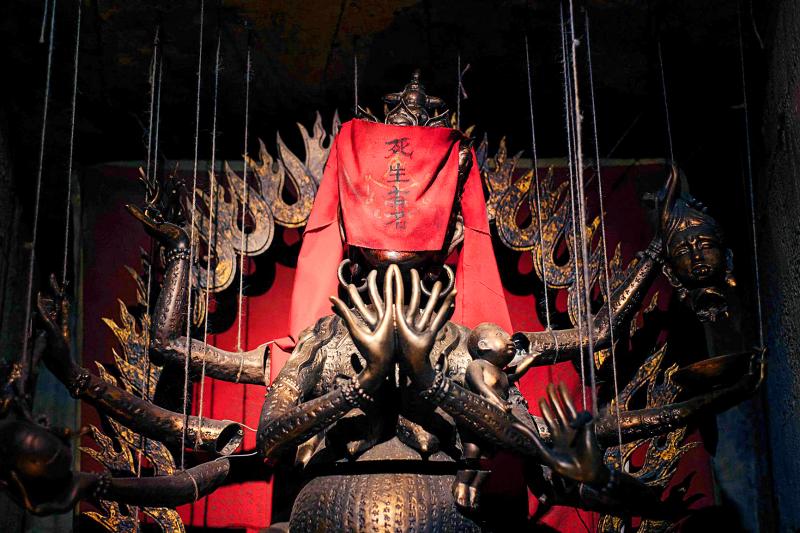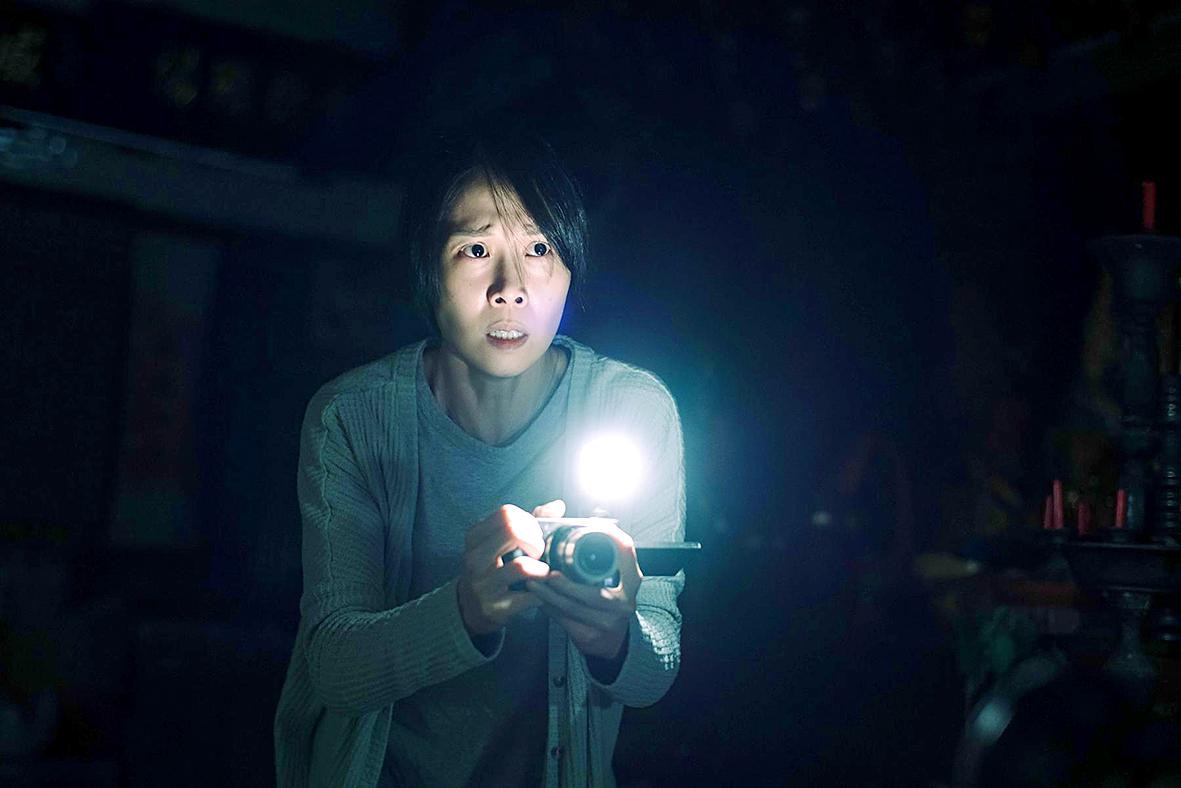Tragic protagonist Ruo-nan (Tsai Hsuan-yen, 蔡亘晏) asks the audience to memorize a symbol and repeat an ominous chant in the opening scene of Incantation (咒). It’s hard to resist the instructions whether you believe in folk religion or not, especially when she adds that reciting it silently works too.
The interactive element is not just a gimmick. It plays an unexpected part in the plot later on. Unfortunately, it is the only intriguing part of the film, which lacks a compelling story to ground the suspense. Incantation is mostly a run-of-the-mill found-footage horror flick that relies on hackneyed scare tactics, gore and stereotypical characters who arouse little sympathy.
The market for horror remains strong seven years after the overwhelming success of The Tag-Along (紅衣小女孩). Incantation, which explores the “uncharted territory” of local cults, touts itself as the “scariest Taiwanese film ever made.”

Photo courtesy of Activator Marketing Corp
This hype helped the film enjoy immense box office success, earning a nation-topping NT$23 million over its first three days in theaters. However, the devices and elements of this genre are getting a bit old, and every film seems to use more or less the same imagery and style choices. What’s really needed is a fresh and gripping tale, but Incantation fails to live up to its promise.
Horror films are not supposed to make complete sense, but in what world can someone snatch her daughter from child protection services, and in front of the police no less, and later bring her to hospital horribly malnourished and covered with putrid sores and syringe marks without any consequences? Even if poor Duoduo (Huang Hsin-ting, 黃歆庭) is really cursed, nobody questions Ruo-nan’s behavior or parenting. She’s even allowed to roam around the facilities where she causes even more harm.
This is just one of many inconsistencies that arise throughout the Incantation, starting with the tired premise. Six years prior to the film’s beginning, a pregnant Ruo-nan, her boyfriend A-tung and his brother A-yuan are running one of those “ghostbusters” YouTube channels that seem to appear in every other horror film these days. Their latest mission is to infiltrate a religious ritual hosted annually by the family of A-tung and A-yuan deep in the mountains. They also plan to sneak into a forbidden cave.

Photo courtesy of Activator Marketing Corp
Of course, they act recklessly, defacing the temple’s gate with graffiti while smashing doors and sacred objects. It turns out that the clan is part of an evil cult that originated in Southeast Asia, and they have to carry out this grim ritual every year to prevent disaster.
The real-life events that the story supposedly draws from are far more spine-chilling than what happens in the movie. In 2005, a family of six in Kaohsiung reportedly became possessed by various deities and brutally tortured each other for a month while subsisting only on water mixed with charm ashes, leading to the death of the eldest daughter. It’s hard to see the connection between the movie and real-life events — except, perhaps, that religion can create illusions in the mind of believers.
It’s not entirely clear what happens to the clan after the YouTubers disrupt the ceremony. Ruo-nan survives since she didn’t enter the cave, although she brings great misfortune to anyone around her. Duoduo is placed in foster care after she is born, but after years of therapy, Ruo-nan is deemed well enough to take her daughter home.
The harrowing events of the first night — creepy voices, lights turning on and off, objects moving on their own and Duoduo acting possessed — should have been enough warning that the curse is still in effect, but Ruo-nan seems to pretend things are fine even as Duoduo’s condition rapidly deteriorates. Would this have happened if Ruo-nan left Duoduo in foster care, or is this all part of her plan to release the curse? The answer isn’t apparent.
Every Taiwanese movie seems to need a touching family moment, and despite her actions, Ruo-nan, along with Duoduo’s former foster father Chi-ming (Kao Ying-Hsuan, 高英軒), are portrayed as devoted parents who will go to any length to save the child and preserve her happiness.
Like the family in Kaohsiung, Ruo-nan is doing what she believes is the right thing, but this question of perception is lost in the muddled mix.

Jacques Poissant’s suffering stopped the day he asked his daughter if it would be “cowardly to ask to be helped to die.” The retired Canadian insurance adviser was 93, and “was wasting away” after a long battle with prostate cancer. “He no longer had any zest for life,” Josee Poissant said. Last year her mother made the same choice at 96 when she realized she would not be getting out of hospital. She died surrounded by her children and their partners listening to the music she loved. “She was at peace. She sang until she went to sleep.” Josee Poissant remembers it as a beautiful

Before the last section of the round-the-island railway was electrified, one old blue train still chugged back and forth between Pingtung County’s Fangliao (枋寮) and Taitung (台東) stations once a day. It was so slow, was so hot (it had no air conditioning) and covered such a short distance, that the low fare still failed to attract many riders. This relic of the past was finally retired when the South Link Line was fully electrified on Dec. 23, 2020. A wave of nostalgia surrounded the termination of the Ordinary Train service, as these train carriages had been in use for decades

Lori Sepich smoked for years and sometimes skipped taking her blood pressure medicine. But she never thought she’d have a heart attack. The possibility “just wasn’t registering with me,” said the 64-year-old from Memphis, Tennessee, who suffered two of them 13 years apart. She’s far from alone. More than 60 million women in the US live with cardiovascular disease, which includes heart disease as well as stroke, heart failure and atrial fibrillation. And despite the myth that heart attacks mostly strike men, women are vulnerable too. Overall in the US, 1 in 5 women dies of cardiovascular disease each year, 37,000 of them

March 2 to March 8 Gunfire rang out along the shore of the frontline island of Lieyu (烈嶼) on a foggy afternoon on March 7, 1987. By the time it was over, about 20 unarmed Vietnamese refugees — men, women, elderly and children — were dead. They were hastily buried, followed by decades of silence. Months later, opposition politicians and journalists tried to uncover what had happened, but conflicting accounts only deepened the confusion. One version suggested that government troops had mistakenly killed their own operatives attempting to return home from Vietnam. The military maintained that the